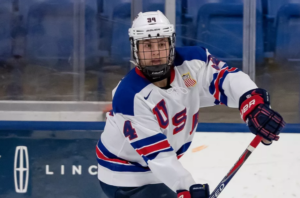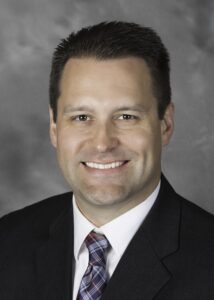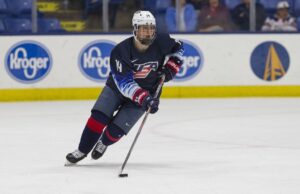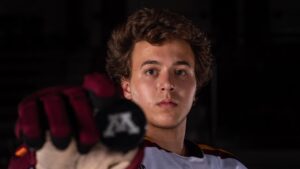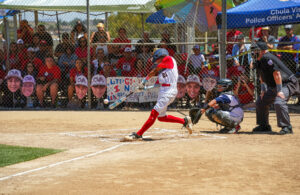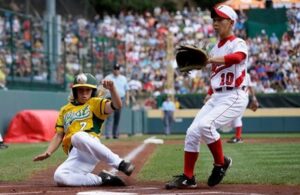LA Kings Prospect Brock Faber Richer for USNTDP Experience
- Updated: November 23, 2020
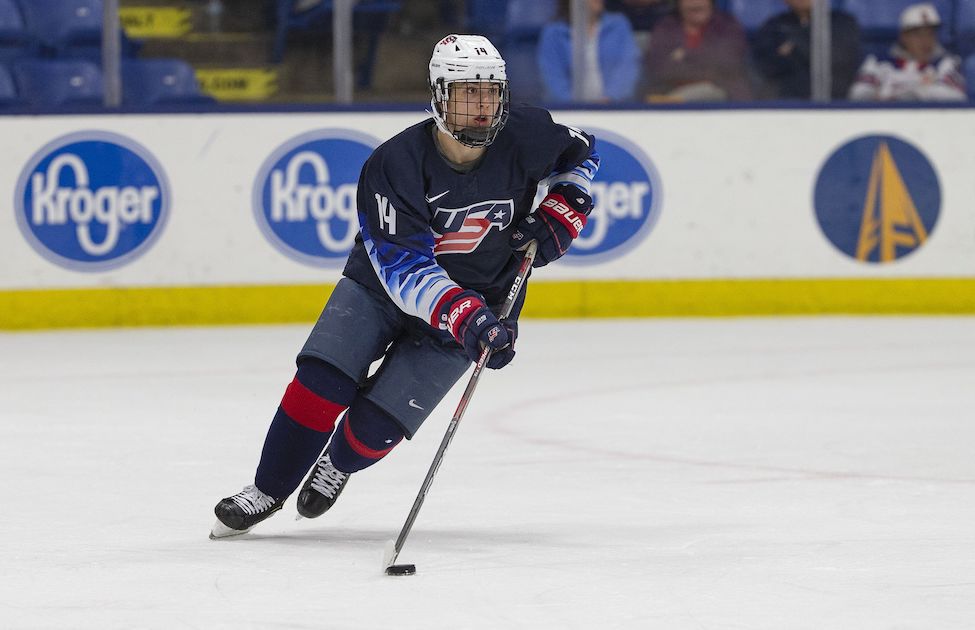
(Photo credit: Rena Laverty)
While the current state of hockey may have a cloud of uncertainty hanging over its head, the Los Angeles Kings nonetheless have a reason to be optimistic for the future — and that is especially the case after last month’s draft.
After selecting the much-heralded Quinton Byfield at second overall and then Helge Grans 33 picks later, the Kings selected who was believed to be one of the more underrated gems in the 2020 draft class in Brock Faber.
Taken at 45th overall, the silver-and-black chose the native of Maple Grove, Minn., having been impressed with, among other assets, being a solid puck-moving defenseman.
Having just begun his freshman season at the University of Minnesota, though, Faber is still very green on the collegiate stage. With that being said, though, the 18-year-old begins his tenure as a Golden Gopher with a plethora of experience from the United States National Team Development Program under his belt.
I recently spoke with Nick Fohr, Faber’s former USNTDP coach, about the youngster’s talents on both sides of the puck, his overall improvement with the USNTDP and his advice for Faber as he embarks on his collegiate career.
A Solid Line of Defense
As already alluded to, Brock Faber’s defensive prowess helps him stand out as a bona fide talent on the ice. As for the specifics that make Faber so solid defensively, Nick Fohr filled me in on what the 18-year-old has to offer.
“Brock is a very good, transitional hockey player from the back end,” Fohr said. “His best assets are his skating ability and his competitiveness. So, the fact that he skates so well lends to the fact that he defends the way he does.”
Additionally, the USNTDP coach was especially impressed with Faber’s passion for playing defensively — something that’s harder to find from a player so young.
“It’s rare to find defensemen at the age that he is who enjoy defending and Brock enjoys defending and he takes pride in that,” Fohr observed. “Brock is one of the top — if not the top — defensemen I’ve coached at the [US]NTDP over the last nine seasons at defending the line rush.”
While teams may generally enjoy entering the attacking zone, that wasn’t usually the case when Faber was on the ice for the opposition.
“He’s very, very good at defending as the other teams try to attack your own end,” Fohr pointed out. “He can close plays out by himself and transition the puck by himself up to forwards and allows you to attack the other team while they’re somewhat vulnerable. So, he’s a really good player when it comes to that and he really helps the offense by having good gaps and the ability that he has to close out line rushes and helping you go the other direction.”
Better Finishes A-Comin’
While his defensive prowess is evident, Brock Faber has a strong offensive upside as well. Still, there are a few offensive areas in particular where the youngster needs improvement.
“The biggest thing holding him back is those fine touches when it comes time to finish a play off,” Fohr admitted. “The big one is his passing accuracy and we talked a lot about that — Brock and I did.”
Fohr, however, was quick to stress to Faber that where he stands on finishing plays off wasn’t a criticism but rather an opportunity to add to his already impressive skill set.
“He didn’t believe me at first, I don’t think,” Faber’s former coach said, laughing. “But that’s fine. We discussed it but not to point out a deficiency but just to point it out as something that needs to get better. He’s been able to come a long way with that and he understands that now and the importance of it.”
Additionally, accuracy, both in terms of shooting and passing, are another area where Faber isn’t quite NHL-ready. Having just started his collegiate career, though, there is no dire urgency to make the jump to the NHL just yet. With that in mind, time and patience are on Faber’s side. Still, the youngster knows that this is area which needs a fair amount of addressing.
“His passing and shooting accuracy, those types of things have to get better for him,” Fohr noted. “He has the offensive skills like the skating ability and he’s very good positionally, but when I’m talking accuracy, he’s really good at making the right reads and finding the right options. It’s just that if a guy needs the puck right at a certain spot, if your stick goes one way or the other, it makes a big, big difference. So, when I first started with Brock, he might have been two feet off the target at times with his passing, so he’s got to get better at that. But, I think all young players struggle with the importance of passing and the accuracy of it. I just think that if they get it in the general vicinity, that’s good enough. So, he’s not alone in that category by any means but it is something that he’s focusing on and it’s something that I’ve talked to him about and something that he knows he needs to continue on working forward. As he matures over the next couple of years at [the University of] Minnesota, that stuff’s going to come; normal progression stuff.”
While he didn’t reveal his name, Fohr admitted that he had some pertinent advice for Faber which he recently relayed from a fellow USNTDP product.
“I was actually talking to someone the other day, a player the Chicago Blackhawks had drafted and we were talking about some of the same things,” Fohr began. “But, I told him — and it’s very relevant with Brock, too — is that as you start to move up the ladder — and you come to our program here, call it the junior level, and move up to the college level and then the pro level — the biggest difference is when you watch an NHL team practice as opposed to a college team or a junior team. Those guys don’t miss passes. The passes are where they need to be and the guy on the other end receives the pass, hits the sticks and snaps it wherever it needs to go from there, and I think a lot of that is just maturation.
“I think that will continue to come for him just as he continues to grow naturally but if he continues to focus on it, really focus on it, it’s going to speed up his progress and hopefully get him to play in the NHL faster because that is holding him back from that level right now.”
Increased Strength, Skill and Maturation
On paper, a two-year window to grow may not seem like much. Then again, we are talking about a teenager.
Between his arrival at the USNTDP in 2018 and his departure earlier this year, Brock Faber has made leaps and bounds in terms of both his abilities on the ice and his maturation off the ice. Few were more impressed by this than Faber’s former coach.
“Brock changed drastically as a player,” Fohr beamed. “When Brock came to us, he was coming out of bantam hockey in Minnesota, not high school hockey like a lot of our kids come from.
“In school, he was only a freshman when we were recruiting him from bantam-level hockey. To make the jump from bantam, that was a big jump for him. It took a little bit to get his feet underneath him, that’s for sure, and he was able to do that. From day one, he was into it and he was locked in. It was something he was really good at throughout the entire process.”
What may have impressed Fohr most, though, wasn’t so much Faber’s desire to improve his game but his desire to do so right away. Literally.
“Brock came in a little recruiting trip just to check in and see the place,” the coach reflected. “I sat down with him and his parents and showed them how I like to coach the defensemen and what we’d like to do and we got done, asked him if he had any questions and he goes, ‘Can we practice that today? I want to try that.’ We were getting ready to go out on the ice for practice and I was, like, ‘Yeah, we’re going to do some of this today. You’ll have a chance to do this,” and that’s just his demeanor. He really grew a lot on the ice as a player — his ability to skate, his ability to make plays — just the normal hockey stuff. He grew immensely. But, his maturation through the two years was just as impressive: to see him, to have the conversations I’ve had with him in year one to the conversations I was having with him at the end of year two.”
Fohr continued.
“He grew a lot and he’s a guy that can handle situations and have very good conversations with adults. It’s not always easy for high-school-aged boys to have a mature conversation and Brock can do that type of stuff. His approach to daily habits, even, is very mature. He’s just grown a lot on and off the ice and he just wants to be a pro so bad that he understands the importance of all those things. And honestly, he benefited from his teammates, too. We had a handful of guys who were really, really serious about how to do things and the right way to do things are and he jumped on their coattails with that stuff and learned from that. That really helped move that needle towards making it to the NHL further, if that makes sense.”
Overall, Fohr couldn’t be more eager to see Faber fare in the future, both at Minnesota and in the professional ranks.
“I’m excited for him,” the 43-year-old emphasized. “He’s in a really good spot. I saw him recently at the World Junior tryouts and he looked great on the ice. He wasn’t able to skate much this summer with COVID but he looked great. He looked like the old Brock and it was great to see.”
To Minnesota and Beyond
While he was held off the scoresheet in his first two games on Thursday and Friday, Faber and the Golden Gophers opened the season on the right foot, defeating Penn State by 4-1 and 3-2 counts. While he was held without a point, though, Faber recorded a plus-two rating with plenty of room and time in front of him to get used to playing at the University of Minnesota.
As for Nick Fohr, he offered some sound advice for his former blueliner.
“For the college level, I talked to Brock a lot about choices and making the right choices at school,” Coach Fohr began. “We’re lucky with what we have at the [US]NTDP and how we operate. We’re there with them as coaches a lot and we can help guide them to making choices and decisions on what would be a good use of their time and how to continue to move forward. So, we talked about making sure that he’s making the right choices, being focused on the appropriate things in school. Most of us who have gone to college and have gone through that process know that you can get sidetracked pretty easily, and that’s not all bad, either. It’s actually good for them to go through that type of stuff.
“So, that was the big thing that I talked to him about: to stay focused and to make sure that he’s making good choices most of the time. He’s not always going to make the best choices, and that’s okay, and not to get too concerned if he makes a bad one. That’s a part of living and learning.”
Of course, the USNTDP coach would have been remiss had he not advised the Kings prospect about his game.
“On the ice stuff, we talked a lot about focusing on continuing to develop his attributes, the things he’s really, really good at and continue to work on those things,” added Fohr. “Make sure that those things stay your strengths and then start working on some of those decisions and try to bring some of those things along so that they’re not a deficiency and that they become a strength as well. So, he knows the things that he needs to do from that standpoint. He’s going to have to do some of that by himself and that’s part of the maturation process in moving from junior hockey to college hockey. The [college-level] coaches aren’t always going to be there to help him do that stuff and he’s going to have to find ways to do that himself and with his teammates. That’s the advice I had for him there.”
While he didn’t offer much advice on the NHL, Fohr has always stressed to his players — not just Faber — to focus on the task at hand, to be sure that they’re ready to be there, and not stand in awe of the NHLers they may have idolized before.
“When you step on the [NHL] ice, you want to be ready,” the coach noted. “And when I talk about ‘ready’, it’s all the physical stuff but it’s the mental stuff, too. It’s the belief that you belong there and that’s a big part of it.
“Some of those guys get out there and they kind of get in awe of being on the ice with a [Drew] Doughty, like, ‘Oh my God, there’s Doughty,’ and trying to impress him the whole time and trying not to embarrass yourself, too, around him. So, my goal, and I tell this to [my players] when I meet with them early on in our two-year process is that when they step out onto the ice at the NHL level for the first time and on the ice with a Doughty, that he wants you out on the ice as his partner, that you’re physically ready with your skills and your hockey ability, that you’re mentally ready that you understand the game well enough so that when it comes time to play, Doughty’s looking at the coaching staff saying, ‘Hey, put the kid on the ice with me. He knows what he’s doing and he makes my life easier out here.’”
For this, Fohr uses another of his former USNTDP defensemen as a prime example; someone who has found great success at the NHL level thus far.
“The best example I have of that is Charlie McAvoy playing for Boston,” Fohr said. “He was another one of the guys that I coached who got called up in the playoffs and played with Zdeno Chara. Chara wants to play with Charlie McAvoy because he makes Chara’s life easier out there, and Brock’s similar to that type of player (McAvoy). So, we talked a lot about being ready and understanding that when it happens, he’s going to be ready as mentally and physically as he is. And hopefully that’s the case: that Doughty wants [Faber] as his partner because I think that would be a good match for sure.”
The 2020 Draft was an impressive one for the Los Angeles Kings and Brock Faber factors into said success.
At 6-feet and 193 pounds, he may not be the biggest player, or even the most charismatic, but Faber nonetheless carries with him a plethora of promise into the collegiate ranks. So, while it may take some time to think about the youngster cracking the Kings lineup, the road to the NHL looks to be a bright one for Faber.
The United States National Team Development Program has proven its worth across the NHL and the Los Angeles Kings are no exception to this with, among others, fellow team prospect Alex Turcotte, who plays for Minnesota’s rival, Wisconsin. Overall, fans of the silver-and-black should be excited for Faber, and Nick Fohr has offered plenty of reasons why.
Another coach who taught Faber with the USNTDP was new Ontario Reign coach John Wroblewski. He shared his own testimonial on the Kings’ new prospect.
“He’s a high-end character kid loves to compete and already has a pro mentality,” Wroblewski told me just minutes after Faber was drafted. “Fantastic defender who has outstanding gap control and can close on the opposition and suffocate attacks. He’s capable offensively with a sure stick and good vision.”
Perhaps the two will be reunited once Faber begins his professional career. We’ll see. In the meantime, Faber’s set to enjoy his time at Minnesota — something Nick Fohr is excited to see.
“He’s got a ways to go still with some of the other areas like his offense but for the most part, he’s in a really good spot and he was a real joy to coach for the two years that I had him,” Fohr concluded. “I think highly of him and I think he has a very bright future.”
Due to COVID-19, his freshman season will be an abbreviated one. Nevertheless, if his time with the USNTDP is any indication, expect Brock Faber to make the absolute most of his time with the Golden Gophers.
A defenseman who can move the puck well and transition quickly into an offensive player fits the description of someone worth keeping an eye on. Brock Faber fits that bill to a T, giving the Los Angeles Kings and their fans even more reason to feel excited for what’s in store down the road.

